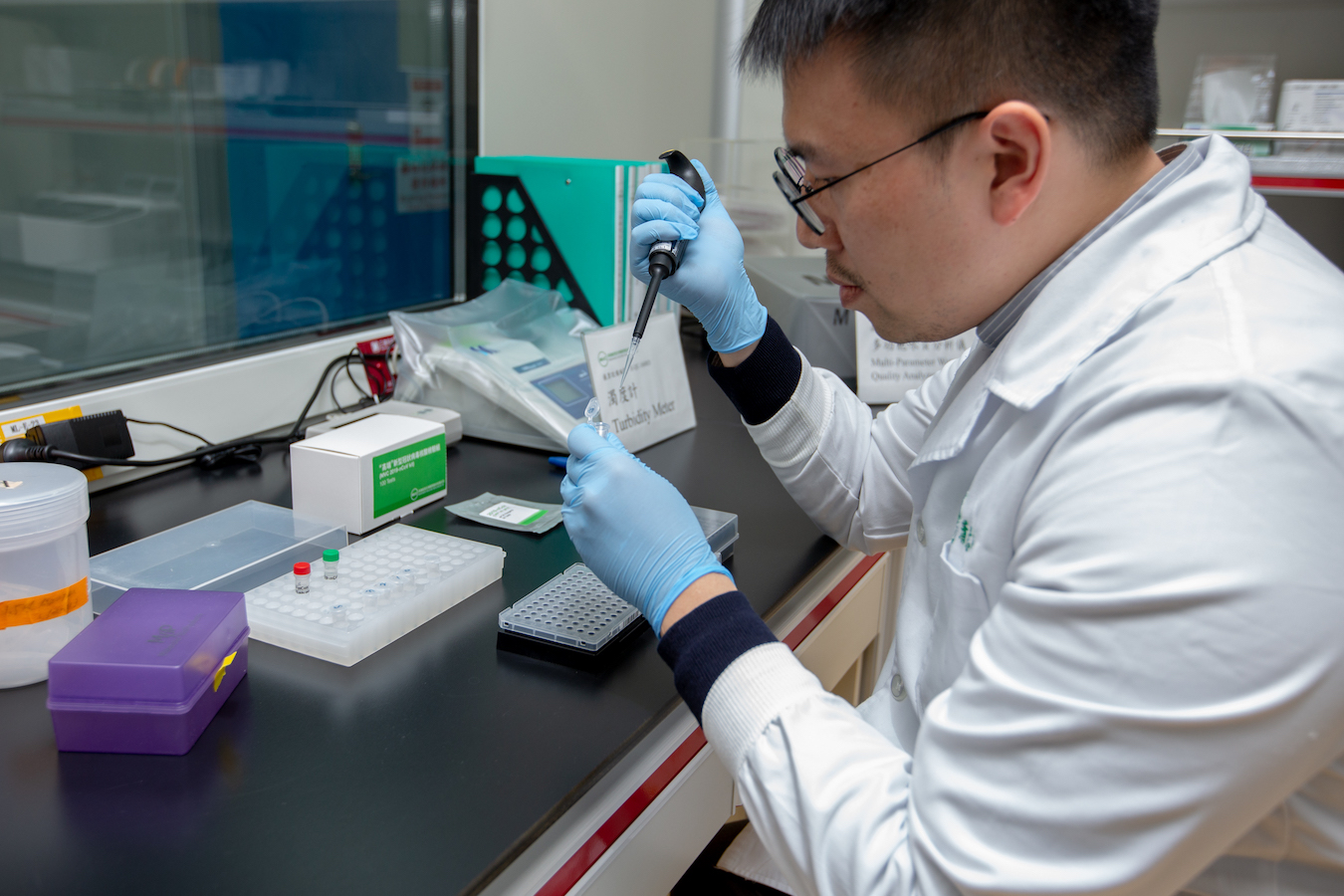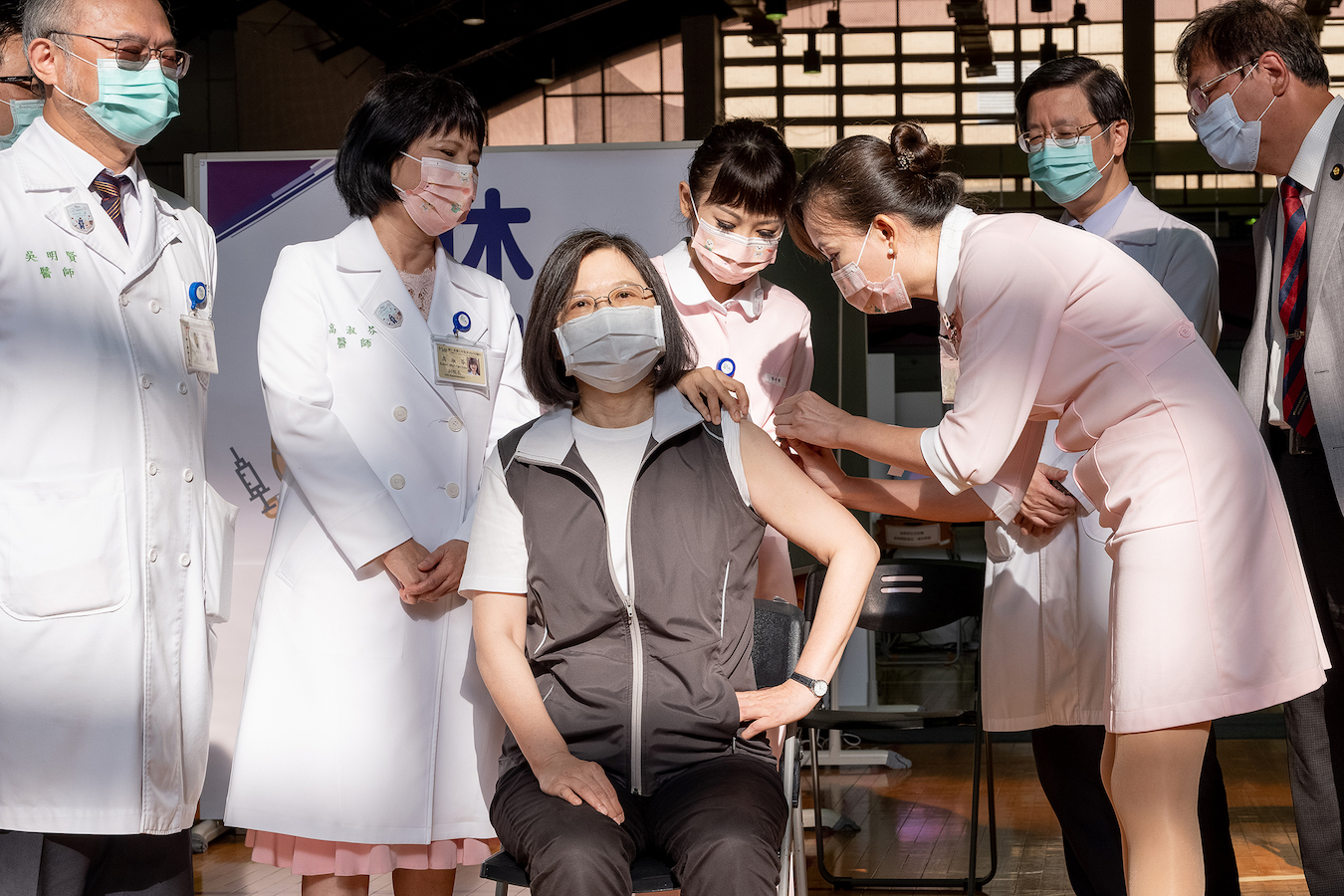by Brian Hioe
語言:
English
Photo Credit: Chien Chih-Hung/Office of the President/Flickr/CC BY 2.0
AN INVESTIGATION into allegations of insider trading against Medigen Biotechnology Company executives could prove a sensitive matter for the Tsai administration going forward.
Medigen is the company that manufactures Taiwan’s domestically manufactured and developed vaccine, which is also referred to as Medigen. The Tsai administration leaned into and assisted with the acceleration of Medigen development at a time when Taiwan lacked vaccines, seeing as at the time only large, powerful countries such as the US and China had vaccines.
Earlier this month, company executives including chair Stanley Chang, and 17 other individuals were questioned by prosecutors. Raids were conducted to seize documents at 16 locations, including at the company headquarters and the homes of some of the questioned individuals.
 Photo credit: Wang Yu Ching/Office of the President/Flickr/CC BY 2.0
Photo credit: Wang Yu Ching/Office of the President/Flickr/CC BY 2.0
Chang was released on 300,000 NT bail, while his sister Chang Tzu-ling and her husband Huang Tzu-liang were released on 500,000 NT bail. Chang and Huang both sit on Medigen’s board of directors. The company’s former Chief Financial Officer, Bill Ou, was released on 100,000 NT bail. Prosecutors seem to be focusing their investigation on increases in Medigen’s stock trading value ahead of rumors about the vaccine, around the time of the start of the COVID-19 pandemic.
Medigen has denied, however, reports that Chang pleaded guilty to insider trading charges while being questioned by prosecutors. Such reports were mostly from pan-Blue media outlets.
It may not be surprising that pan-Blue outlets would report such. Namely, vaccines were a major issue that the pan-Blue camp sought to attack the Tsai administration over. The pan-Blue camp first alleged over Taiwan’s lack of access to vaccines, claiming that this was a particular fault of the Tsai administration for failing to place any vaccine orders when much of the world did not have vaccines.
As a response, the Tsai administration accelerated the development of domestically manufactured and developed by Medigen and United Biomedical, both Taiwanese companies. Yet the KMT alleged that the Tsai administration was playing dangerous games with the lives of Taiwanese, as well as that its only interest in developing these vaccines was because of illicit investments by Tsai and other Tsai administration officials in such companies.
This did not prevent the KMT from alleging favoritism toward Medigen by the Tsai administration when Medigen’s vaccine received Emergency Use Authorization, skipping a phase three trial, but United Biomedical’s vaccine was deemed to be insufficiently effective. As Medigen pursued phase three trials in other countries, the KMT sought to suggest that the Tsai administration hoped to experiment on the population of diplomatic allies of Taiwan, and that this would sabotage Taiwan’s diplomatic ties.
When AstraZeneca vaccines began to arrive in Taiwan, donated by the US as a show of support, the KMT began to allege that AstraZeneca vaccines were dangerous and led to blood clots, with the US foisting unwanted vaccines onto Taiwan. Consequently, the KMT suggested that the Tsai administration was simply taking on unwanted goods from the US, as with unneeded weapons sales, and this was also endangering the lives of Taiwanese. This did not prevent a number of KMT politicians from violating the priority order for vaccination to receive AstraZeneca vaccines, however.
 President Tsai Ing-wen being vaccinated with Medigen. Photo credit: Makoto Lin/Office of the President/Flickr/CC BY 2.0
President Tsai Ing-wen being vaccinated with Medigen. Photo credit: Makoto Lin/Office of the President/Flickr/CC BY 2.0
With pan-Blue politicians such as Terry Gou calling for Taiwan to import BioNTech vaccines, eventually receiving permission from the Tsai administration to negotiate on Taiwan’s behalf after much back and forth, the KMT has continued to allege favoritism toward some vaccine brands and not others by the Tsai administration. Gou has continued to attack the Tsai administration for its reliance on Moderna rather than BioNTech for the current generation of vaccines used in vaccinations. Likewise, as the Tsai administration declined to accept Chinese vaccines, the KMT has tried to suggest links between Medigen and China to point to what it frames as hypocrisy, in light of links by the company to some Chinese companies for testing of the vaccine.
It is to be seen if Chang and others are found guilty of charges they are under investigation for. But this would not, in fact, be surprising, given how deeply rooted corruption can be in Taiwan. When the Tsai administration boosted production of medical masks in Taiwan as a response to the initial COVID-19 outbreak, for example, companies on the “national team” for medical mask production were found to be passing off cheaper, non-medical use Chinese masks as made in Taiwan products. Yet if this turns out to be the case, one can expect the pan-Blue camp to make full use of the incident to attack the Tsai administration.

